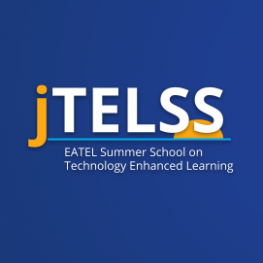Speakers
Cleo M. Schulten
University of Duisburg-Essen, GermanyIrene-Angelica Chounta
University of Duisburg-EssenParaskevi Topali
Radboud University, The NetherlandsAlejandro Ortega-Arranz
Universidad de Valladolid, SpainMikhail Fominykh
Norwegian University of Science and Technology, NorwayDaniele Di Mitri
German UDS, GermanyKatharina Dahmann
Studiumdigitale - Goethe University Frankfurt/Main, GermanyStart
18/05/2024 - 14:00
End
18/05/2024 - 17:30
Writing a book together: Collaborative writing using MarkDown and GitHub – DE-TEL Hackathon Edition
Saturday 18/05 14:00-17:30h
Workshop Space A
Needs Analysis
- Collaborative writing is an essential soft skill for any academic. From publications to project proposals, collaborative work in academia often starts and ends with writing. And more often than not, we will work on these together. But as with any skill, collaborative writing requires practice.
- DE-TEL open textbook provides an (yet incomplete) educational resource for PhD candidates in TEL. The book project already contains a comprehensive knowledge base but through its GitHub repository TEL community members can contribute with new book chapters or by extending existing ones.
- Git is one of the most popular version control systems. Git repositories can be hosted on Github which is a popular choice for open-source projects. Its utility for tasks, such as paper drafting, is often overlooked by non-coders.
Through the hackathon workshop we aim to support participants familiarize with GitHub, practice collaborative writing and engage with the DE-TEL Book.
Learning Objectives
After participating in this workshop, the participants will be able to:
- Be more efficient in collaborative writing
- Better understand version control systems
- Set up and work with GitHub on their devices
- Edit layout using the Markdown language by using online editors such as Etherpad
- Understand how open-source, community-driven collaborative projects work
- Contribute to the open-source, community-driven collaborative project of the DE-TEL textbook
Pre-activities
The workshop will be set up as a hackathon, which means we intend to have a majority of the time spent in teamwork, supported by mentors.
Participants will be asked to prepare by familiarizing with the DE-TEL book and filling out a brief questionnaire. Participants will be provided with a short pre-tutorial, before the hackathon, that will support them in figuring out the GitHub fundamentals and setting up the DE-TEL working environment. Carrying out the pre-tutorial before coming to the hackathon is advisable but not required.
Session Description
- Welcome & short introduction into the topic [5-10 min]
- Introduction to DE-TEL, an open-source community-driven textbook project [15 min]
- Guided tutorial on GitHub set-up and usage as needed [15-20 min]
- Group formation based on interest/ideas [5-10 min]
- Quick presentation of group goals – what are the groups going to work on? [5 min]
- Team-work on collaborative writing a chapter to be included in the DE-TEL book [35-50 min]
- Workshop organisers will support the participants if/when they have questions/problems
- Checkpoint – what did we accomplish during the first team-work session? What’s the plan for the next work session? [15 min]
- Team-work on collaborative writing a chapter to be included in the DE-TEL book [40-45 min]
- Workshop organisers will support the participants if/when they have questions/problems
- Participants will submit their proposed extensions to the DE-TEL book providing a continuation of the project [5-10 min]
- Presentation of final results [20 min]







